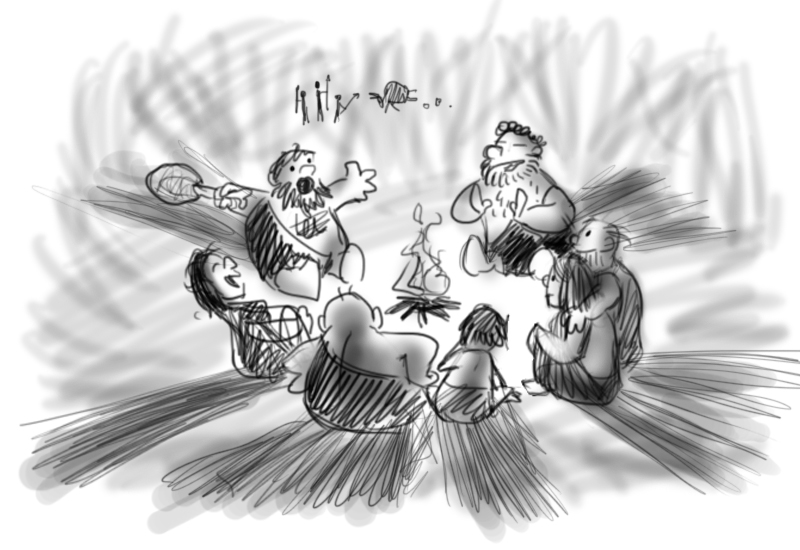
Asher Medrano
Storytelling Coach
Seeking POETS, NOVELISTS, GRAPHIC-NOVELISTS, PLAYWRIGHTS, SCREENWRITERS, VIDEOGAME-WRITERS, and everything in-between! If you wish to improve your ability to deliver great experiences to your audience, join our Live-discussions on Narrative Theory, aimed at simplifying your understanding of the timeless art of STORYTELLING.
My Story
You’ve probably heard the saying, “writing is rewriting”. Well, as a kid, that second part never crossed me! I would punch out final drafts right and left like nobody’s business. I remember my teacher posting my stories in the hall outside our classroom, and the longer those stories got, the prouder I was. This is because I was in love with this idea of STORYTELLING. That we could use nothing but our minds to recreate another reality and fill it with adventures our characters could overcome. This was very powerful and freeing to me!
Unfortunately, like many of us, as I got older, I found myself under that social-spell that conditions us to be under constant worry over performing everything the “right way”. Whereas some people may worry too little about proper technique, others, like me, can worry way too much! And when it comes to writing, either extreme hinders our improvement. This is exactly what it did to me. I slowly became drained of all the creative enjoyment I had as a child; and being a natural perfectionist, it really hurt my productivity. Not because I was any less creative. In fact, with age, we have the potential to be more! The answer was simpler and harsher than that… Like many writers, I had grown scared to death of being bad at it…
And so, it begun. To compensate for these inadequate feelings, I quickly became overly concerned with learning the “How-To’s” of writing that I wrote less and less as time went by. Having a natural eye for visual design (hence, the self-portrait), I first began to learn from books on Visual-Storytelling. Such as books on how to design Graphic Novels, Screenwriting, Storyboarding and books on various topics in Filmmaking. Then, I branched out into general-Creative Writing and Narrative Theory-books. I eventually went as far as to research fields of Philosophy, Science, and topics like Communication Theory in an attempt to obtain that edge to become a better storyteller. Though this was causing me to learn a great deal about storytelling, I was not bringing me any closer to actually being a writer. I still thought of my characters and stories a lot, but I spent less time writing about them and more time feeding an illusion of progress. Nothing could revive that trust in my imagination again. That it was enough to see me to the end of my first drafts, like it did when I was a child. Nothing got me closer to actually sitting down and completing any of my ideas. Not even turning to the best writing-inspiration texts could loosen the grip that perfectionism had on me. If anything, it was moving me further and further from my writing desk…
There is a saying, however, that says “all hard work is never wasted”; and in this unproductive exile I was in, I found it to be true. I discovered new perspectives in other fields that shed a new light over the origin of narrative concepts, principles, and techniques. I began to find connections between storytelling and perspectives in Biology, Psychology and Philosophy, among others. Perspectives that made sense out of the ambiguous nature of Human perception of narrative. And to my surprise, it made me able to see a better way approach to teaching creative writing that I had not been able to grasp in the any books I read. An approach that aimed to liberate student’s creativity while still guiding them to effective writing.
You see, like I said in the beginning, “writing is rewriting” Lucky for us, reality is ruled and written by broad principles before it ever gets down to complex details. This makes it possible for so much variety and unpredictability to unfold in-spite of reoccurring themes. The same is true for Storytelling! It is a collaboration between our unlimited imaginations and our objective intellect to recreate a reality for our audience to enjoy and learn from; it is a balancing act between what could-be and what should-be; Purposeful-entertainment at its best! And that reveals the order in which Storytelling should be approached!
Therefore, my approach to improving a students writing does not prioritize in teaching you how to be a good storyteller (most of that is in you already), but instead it prioritizes on the understanding of what stories ARE and what they ARE NOT. All this through carefully selected discussions about narrative concepts, delivered in the simplest order, in digestible doses, and AFTER we have experimented with our writing exercises! This will allow you to instinctively write your stories as awesomely as you’ve been seeing it in your childlike imagination, while remaining free of the overwhelming intimidation that you are making mistakes along the way. And it will be up to YOU to translate that wisdom to your Storytelling medium of choice, including life!

